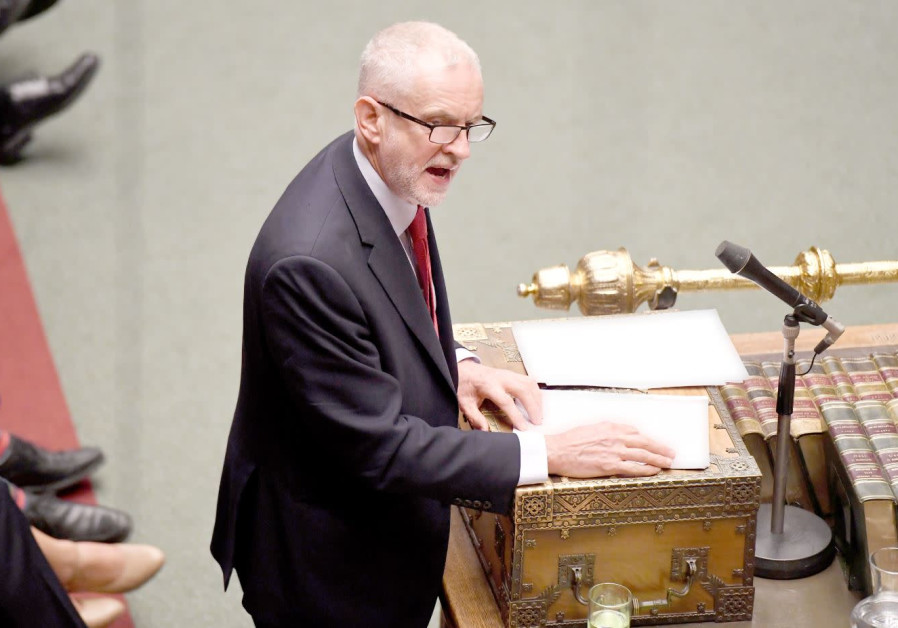Anti-Zionism’s shift from extremist fringe to mainstream discourse

UK LABOUR leader Jeremy Corbyn speaks in the House . (photo credit: Courtesy)
Following the shock of the Holocaust, openly antisemitic expression was silenced, or at least muted, for a few decades. Today, in most Western societies at least, antisemitism is the hatred that dare not speaks its name. Among the most lethal new, covert forms of what Norman Geras has called “alibi antisemitism” is anti-Zionism, in which the perpetrators disguise their true feelings behind the fig leaf of a respectable, even humanitarian ideology.
Anti-Zionism has elbowed its way from the extremist fringe into the mainstream political discourse to the point where many diaspora Jews are feeling increasingly anxious about their futures. In the UK, for example, the opposition Labour party has become infected with antisemitism under the leadership of Jeremy Corbyn who, we are assured by his legions of supporters, “doesn’t have an antisemitic bone in his body” despite his public hailing of the genocidal Hamas and Hezbollah terror groups as his “friends” and many other disturbing faux pas.
This is no collective paranoia on the part of a hypersensitive Anglo-Jewish community: earlier this year, the Equality and Human Rights Commission, the UK’s official anti-discrimination watchdog, announced that it was launching an inquiry into whether the Labour party had “committed unlawful acts of discrimination or failed to respond to complaints of unlawful acts in an efficient and effective manner.”
To counter the threat posed by anti-Zionism, it is necessary to try to diagnose the nature and ramifications of the phenomenon as a first step towards mounting credible countermeasures. Henri Stellman, a Belgian political scientist working in London, has attempted to point us in the right direction. As he embarked on this daunting task several years ago, he discovered something extraordinary: academic research into anti-Zionism, and its relationship to antisemitism, has been unaccountably neglected. He therefore set about identifying and categorizing the numerous manifestations of anti-Zionism in a systematic and accessible manner.
A key problem is denialism. As Stellman points out, “Anti-Zionists are very sensitive when charged with antisemitism.” Anti-Zionists protest their revulsion against all forms of racism and, in an ironic twist, accuse their accusers of conspiring against them “to shut down criticism of Israel.”
What is astonishing is that this transparent ruse, itself utilizing an antisemitic trope, appears to have worked. At a recent Intelligence Squared debate in London, the motion that “Anti-Zionism is antisemitism” was defeated by a margin of 4-1. Those who applaud that result will be discomfited to read Kaplan and Small’s landmark 2006 study of 5,000 citizens in 10 European countries. Stellman quotes their important finding of a direct statistical correlation between anti-Israel rhetoric and antisemitism: “Even after controlling for numerous potentially confounding factors…anti-Israel sentiment consistently predicts the probability that an individual is antisemitic.”
The sickness that lies at the heart of the current assault on Israel’s legitimacy is laid out in forensic detail by Stellman’s dispassionate, methodologically rigorous approach. The result is this little volume packed with valuable – if often depressing – information presented in a way that activists and scholars alike should find compelling. The short chapters are easy to read, aided by bullet points and a comprehensive index. The final section contains a set of tools specifically designed for use by trainers and educators.
Some of Stellman’s assertions will elicit controversy: is there really any practical difference between “political” and “anti-Israel” anti-Zionism? Both have the same ultimate objective. And are statements lacking nuance, such as “Islam is basically an expansionist religion” and that “Muslims must wage a ‘Jihad’, a ‘Holy War’, until the whole world becomes “Dar al-Islam” appropriate in a text that explores (among other issues) religiously inspired hatred of one group by another?
The evidence for the central thesis of the book – that anti-Zionsim and antisemitism are closely interlinked – is overwhelming. This is an observation with major implications for the discourse around the Arab-Israeli conflict, yet it is one that is rarely discussed or even acknowledged by allegedly “expert” commentators, academics, politicians, NGOs and the media. That lacuna of awareness represents an existential threat to the future of Israel (and, by extension, the Jewish people) and, in consequence, the prospects for peace.
This handbook is an important contribution to the scant but growing literature on anti-Zionism. Stellman has formulated an important response to that vacuum of serious academic thought. In any future edition (and I gather that the Stellman is planning a follow-up book containing new material), it would be helpful to the reader if the author could add a section by tying together the disparate threads of his argument into a small number of key conclusions. Ideally, these would be linked to a series of recommendations as to how activists might develop practical and effective strategies for countering the anti-Zionist threat to Israel, Jews and civilized norms everywhere.
The writer is the Emeritus Professor of Paediatric Epidemiology at the University
`; document.getElementById(“linkPremium”).innerHTML = cont; (function (v, i){ });





Comments are closed.